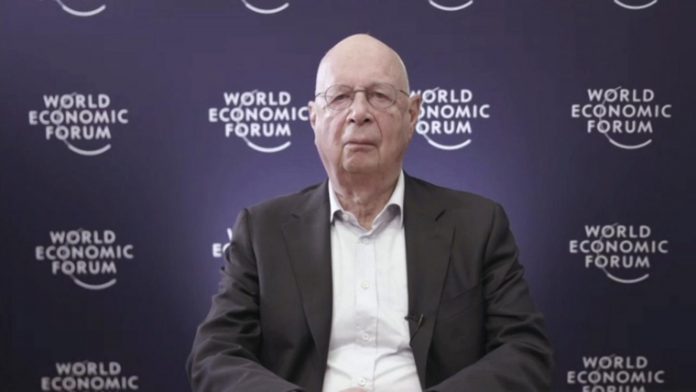If you’re watching the World Economic Forum’s annual ruling class confab in Davos this week, you might be surprised by the lack of disagreement among the rich and powerful there. Every panel in Davos acts as a reinforced echo chamber in which there is one problem, one objective, and only one solution. Regardless of who populates these panels and speeches, whether it’s invited corporate media, governmental officials, and/or business executives, there’s never any apparent dissent or difference of opinion expressed.
Given that the World Economic Forum is best understood as a narrative and ideas generator for the global ruling class, one might be under the impression that Davos would be a place for a healthy, robust debate. That’s why many new observers in the space have been understandably baffled by the incredible conformity expressed by speakers and attendees at the Swiss retreat.
Many noticed as former CNN host Brian Stelter, who claims to defend the importance of a free press, smiled and nodded at a co-panelist’s vicious attack on open speech.
European Commission VP Věra Jourová at the WEF:
“Illegal hate speech, which you will have soon also in the U.S. I think that we have a strong reason why we have this in the criminal law.” pic.twitter.com/iLR1MePTYT
— Washington Free Beacon (@FreeBeacon) January 17, 2023
Former New York Times editor Jill Abramson offered her own no holds barred commentary on the matter.
Author Walter Kirn tweet expressed his fascination with “how little disagreement there is.”
What strikes me most about the WEF is how little disagreement there is. The largest matters on earth are at stake (supposedly) yet the conferees don’t argue. They don’t debate. All points seem smugly settled. It’s an ego orgy, a great self-satisfied mutual grope.
— Walter Kirn (@walterkirn) January 19, 2023
The truth of the matter is that the World Economic Forum and its leaders prefer conformity to debate. In fact, debate is actively discouraged, and stepping out of line — via a narrative violation — is grounds for permanent removal from Club Davos.
Klaus Schwab discusses this very topic in his book, “The Great Narrative,” which is book two of his infamous “The Great Reset” series.
Discussing the goals of the WEF, Schwab starts by claiming that his outfit is open to all ideologies and political perspectives. We quickly learn that he is not truly referring to all perspectives, but only those that he views as legitimate.
There is one specific group of people who he says are to be dismissed whole cloth. That group, of course, is individuals and groups that do not accept the World Economic Forum’s climate narrative, and its very specific “solutions” to the supposed climate problem.
“Climate action, sustainability, inclusivity, global cooperation, health, and well being” are “the most important issues to address in our times,” he writes. “Not moving right away and decisively would render our biosphere so hostile as to derail global economic growth and … further endangering political and social stability.”
In short, Schwab’s narrative insists that the world is on fire, and there is no room for debate on this issue, and the only solution is to roll back human progress.
The publicly diplomatic Schwab expresses absolute disdain for these non compliant actors, who he notes, with disgust, are largely located in the United States.
Klaus Schwab *hates* non-conformity, deciding that those who refuse to comply are conspiracy theorists who are responsible for all of the world’s ills. Schwab says that these “anti-science movements” have acted to “prolong the waning of the COVID-19 pandemic,” adding that we are “hindering both public health, and more fundamentally, our ability to move forward in unison.”
The WEF approaches all of its big ticket items as issues that already have complete and total consensus. Everything important to the WEF is categorized in one form or another as an “emergency,” so they claim there is no room for debating these issues at Davos. This “emergency” is too serious for the speakers at Davos to challenge the narrative. They already have an established problem and an agreed upon solution. The only thing that’s left to debate is how fast they can move forward on these supposed problems and solutions, and how aggressively they will attempt to trample all over our individual rights in the process.
Reprinted with permission from The Dossier.
Subscribe and support here.



